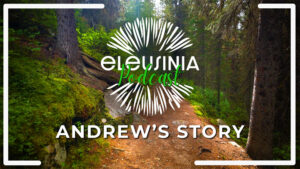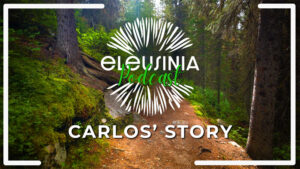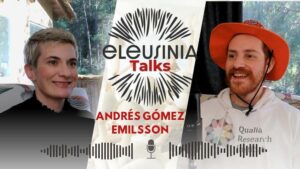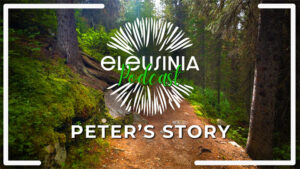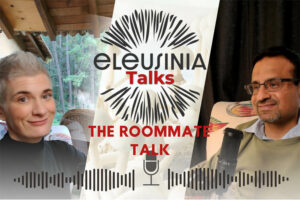Jose shares his story about living a highly successful life in every regard. Yet he was still plagued with depression, anxiety, and a chronic pain condition. He shares his experience at Eleusinia, and how he plans to continue the work further. Listen here or on Apple Podcasts.
Tawnya: Jose. Thank you so much for coming to the show. Can you tell us a little bit about who you are and the work that you do.
Jose: Thank you so much for having me. I’m a professional in the technology industry. And I would say that I lead a pretty typical American success story type of life – successful in my career, successful in building a happy marriage, happy family, but about 10 years ago, I had my first experience with depression. And since then, I’ve struggled with generalized anxiety disorder and multiple depressive episodes, until about three years ago I developed a chronic pain condition.
And never having experienced chronic pain and not having experience with depression and anxiety, I really, really struggled to understand those conditions and how they were impacting me, how they were limiting my ability to do my job and to maintain relationships. And so it started a multi-year journey. First, obviously because of where I lived, starting with standard Western medicine, seeing primary care physicians, seeing specialists, and taking their advice, which is typical to, try different medicine and not seeing an effective change.
And because of my personality type, I was really wanting to see results. I wanted to see an efficacy of what I was putting into my body and reached a point where I was realizing that the traditional Western medicine practices just weren’t working. They weren’t resolving my anxiety. They weren’t resolving, ultimately, my pain condition.
So I started looking at other options and things would just open up to me. Someone would make a recommendation like, “Oh, well, have you tried physical therapy?” And so I went and tried physical therapy and didn’t see results again. And then someone might say, oh, have you tried acupuncture? So I would go and add acupuncture. And eventually, I had this collection of things that I was doing that were all in an attempt to resolve this anxiety, depression, and chronic pain condition. And it included everything from traditional physical therapy, massage, to Easter n medicine such as acupressure, acupuncture, certain supplements. I was really doing whatever I found or was recommended, and again, not seeing the results. I was seeing some improvement in the anxiety and depression. I was seeing some improvement in my chronic pain, but I had reached a plateau.
And so maybe about a year ago, I had mentioned to my wife that I was starting a process called pain-reprocessing therapy, PRT. And the theory behind PRT is that, and this is specific to my chronic pain condition, is that my body had healed, it had physically healed, but I had such strong neural pathways because of the long duration of the pain that my brain had in essence and addiction to this signal and was continuously telling me that I was in pain, even though there was no longer a physical ailment. And so started exploring a lot of, then how do you approach, changing your brain?
And that’s a really intimidating thing to approach, because it’s really easy to go to physical therapy to resolve a torn muscle or to resolve a physical injury, but the ability to alter your mind, especially as an adult. I mean, we know that as a child your mind is in a hyper state of change, but as an adult that decreases significantly.
And I’m not quite sure how I landed or ended up, on psychedelics. It started with starting to explore marijuana, which I hadn’t really done that much, but unfortunately my experiences with marijuana weren’t positive. Most of the times it spiked my anxiety and gave me physical discomfort.
And so I knew that that wasn’t something that I was really gonna want to continue. I used alcohol as a tool. I didn’t drink significantly, but I could see how I could play with alcohol to alter my mood. But again, it was a management tool. It wasn’t something that was going to resolve or fix it.
And so I brought up to my wife about possibly exploring mostly because I had started to read some articles about the positive impacts that it has on anxiety and depression. And I know for a fact that my chronic pain condition is tied to my anxiety. When my anxiety is high, my pain is high, and if I can lower my anxiety, then my pain goes down.
So. One day my wife showed me a TikTok video of this retreat. And to be honest with you, it took me all of two minutes to decide that it was something that I was going to do. And I told her, I’m gonna sign up. I’m gonna sign up as quickly as possible. So I reached out right away and signed up, found some dates.
And it just so happens that a close friend of mine was visiting. And I mentioned to him that I was going on this and he was also going through some things and decided to accompany me, which has been very, very helpful to have another individual that wasn’t my spouse, but someone that I trust wholeheartedly to come on this journey.
Coming here was a little bit of a leap of faith. I certainly did not know what I was getting into. Having no experience with psychedelics and having very little experience with any drugs whatsoever, you know, this is a huge departure from my typical approach to life. I would say most people probably think I’m very straight laced, disciplined, professional, venturesome but within limits.
And so it was really interesting on day one meeting with the curandera. She gave me this metaphor of being in a box that she felt that I was in a box, but that I needed to come to the realization that the box was not locked.
And that really made sense for me, because again, I’m living this Classic American story of success. I went to great schools. I have a wonderful job. I’m affluent, I have a beautiful home. We travel, like there’s all these positively things that if you look at my life, and I look at my life very positively, but all of those things are in essence, a box. And as a side note, I was also raised in the Catholic tradition which, has a lot of moral and ethical boundaries that are very well defined. And I tried to live within those even though I’m not a very faithful individual.
So this metaphor of a box was actually really profound for me, because there are a lot of boxes that I’ve put myself into and, and constrain myself. I constrain how I behave. I constrain how I present myself to the world. I constrain how I interact with certain people in my life, what do I share? What don’t I share. I constrain my behaviors to be in line with societal rules, religious rules, and I realized, I spent a lot of time and energy trying to stay within that box, even though, it’s not a healthy place for me to be, it felt comfortable.
My guess is that I carried that metaphor into the macro dose. And to say I had an intense experience would be an understatement and coming out of the macros experience, I was actually extremely confused by everything that had happened.
And the first night I was a little sad and disappointed because I felt in fact while I didn’t try to carry an intention into the experience, I had told some people, when I was asked,” Why are you doing this?” I put it really simply, “I just wanna understand it.” And what is it? It is everything.
I want to understand my life. I want to understand my relationship to others. I want to understand my relationship to our world and I just want to understand it. I want to make my life make sense. And so I’m sure I carried those two messages in – that intention of wanting to have a better understanding of my life and my purpose, as well as this understanding of living a very highly constrained life.
It really took me a couple of days and a lot of great conversations with the other attendees to try to put together, what did I take out of this experience? And I had a lot of what I refer to as “vignettes” during my experience. Nothing was linear, I had multiple discreet experiences that were all quite different, both physiologically as well as emotionally and mentally. But a lot of my experiences were around this visualization of every component of my life, every place I’ve lived, every person I’ve experienced, every school I’ve attended, and seeing it as this mental image of a structure that got me to come here. And the important part of this visualization was that it crumbled, suddenly all these, what I would refer to as constructs, fell away and, at some point I decided that I no longer needed to breathe. That that was like an artificial constraint that I had convinced myself that I needed to breathe to be alive, but in this visualization, I realized that that was a lie. It was a falsehood. And that to extrapolate from there, there was all these falsehoods that I needed to abide by – a falsehood that I needed to experience pain, that I needed to believe in a God. There’s all these falsehoods that I felt like, going back to these constructs, that I’ve built my entire life around. And again, it’s the box, right? All of these things that together encompass the constraints that we live our lives within. And I had so many visualizations about these things falling away and crumbling and no longer making sense, and almost it was as if this facade of this container just dissolved. And I’ve never felt such a surge of power and strength, just because I felt this tremendous amount of relief that these things were dissolving around me and I was no longer going to be constrained to them.
And there are things that I know that are meaningful to me. The things that I do, like surfing, or things that I’ve wanted to accomplish, or even things that I have accomplished. And I remember yelling out those don’t matter. They no longer matter. They were these constructs, these false constructs that no longer matter to me.
I’ve already started to think like, okay, well, what do I bring back from this experience? I knew coming in it, wasn’t going to be this one-and-done, come here and go home and I was never gonna have chronic pain, I wasn’t gonna have depression, I wasn’t gonna have anxiety. I knew it was this first step of this process, but I’m an action oriented person. I want to have a plan. I want to have a strategy and what I’ve taken away is that I really need to step back from all these things, all these belief systems that I’ve inherited or have been given to me, or I’ve built myself and really challenge them and say, okay, are these truly constraints that I want to abide by, or are they just things that were given to me that no longer are serving me? And it could be something as little as how I present myself to others or, how restrained I am in, in sharing who I am with others. And I think one tangible example would be when I get back, I know that there’s a set of people that are waiting for me to come back, some of which knew that I came here and others that didn’t. And I’m like, how do I explain this to others?
This is so out the bounds of who I am and how most people would see me. So I think coming into this, there were people where I’m like, “I’m just not gonna tell them, I’m not gonna share it with them.” And that’s just abiding by the construct, right? That I’m gonna build this wall, I’m going to build this box, I’m going to live within this box and they’re not allowed to see in and I’m not gonna let them in. I’m like, you know what, I am going to share this. This was a really purposeful part of my journey and whether or not they believe of the importance of psychedelics or they approve of the morality or ethics around taking… I’m kind of tired of living within that constraint and I’ve just decided, I’m just gonna be open and honest. And if people ask me, I will explain what I did and why I did it and kind of allow them to make it their decisions about whether or not they agree with it. But to me, that’s like one small piece of a construct that I know I can dismantle. And then I’m hoping through doing that it will snowball and there will be all these other constructs that will crumble over time and slowly but surely, dismantle or at least open that box that I’ve been living in for so many years. And I believe that is going to be a significant path for me to get out of this depressive anxiety cycle and, subsequently, my chronic pain condition.
Tawnya: I really liked what you said about allowing things that were constructs to crumble. Like it became really meaningful in your reflection afterwards because we can therefore redefine it and redesign the constructs, like our relationships and our careers. And that was really insightful to me. Does that bring up anything else for you that you.
Jose: Yeah, I think we talked a little bit about the Jesuit tradition of religion. Again, I’m not a very faithful person, but I’ve been raised Roman Catholic and I went to Jesuit high school. And the thing about the Jesuits is that they openly teach you to challenge your religious beliefs and unlike most areas of Catholic religion, which they tell you to take religion on faith and don’t ask anything and don’t challenge it. You should just accept it to be true and abide by their teachings. The Jesuits say, no, actually use every tool available to you: rationality, logic, knowledge, education to challenge the religion. And the reason they do that is because they have such a high level of faith in the religion that they know that it will stand up to those challenges.
So if I extrapolate from that, I think there’s some pillars of your life, there’s the relationship with your parents, there’s a relationship with your spouse, there’s a relationship with your children, there’s your relationship to your job. And these are things that I think we’re told are unchallengeable, but in reality, they are, and they should all be challenged and, hopefully when you challenge them either you will realize they are healthy or that maybe they aren’t healthy and maybe they do need to be altered, whatever it is, but the challenge is you need to question and challenge these things that maybe previously you thought were taboo or unchallengeable, and then see if they withstand the challenge. And if they don’t, then take that opportunity for change. And that could be change in your relationship. It could be the ending of a relationship. It could be the changing of your job, your profession. It could be the changing of where you live and how you live your life. It could be a change of religions, but take everything that you believe is an imutable pillar of your life and really examine it and then be brave enough to make the change if it’s necessary.
Tawnya: And in your psychedelic experience, that really became the catalyst for you to do that for the first time.
Jose: Absolutely. I mean, within the context of the experience, I just remember feeling so strong and I know that we discussed it later, with a lot of laughter, that physics no longer applied. And I can put myself back into that experience of really, truly at the heart of my being, believing that physics no longer applied. I mean, talk about the ultimate construct, or the unbreakable construct of physics and being able to have such a strong belief that the rules of physics no longer applied to any of us.
I had a lot of thoughts about relationships with people. I had a lot of thoughts about religious belief systems and just again, how easily they crumbled because they were false, they were a facade. Obviously now I’m no longer under the influence and clearly physics apply to me. I can’t make decisions around that, but some of those other things, like all these beliefs that I’ve held really, really tightly, I don’t hold onto them as tightly anymore. And I feel less of an attachment towards these belief systems that I’ve held for many, many years, and I’m hoping that the farther away I get from it, the experience, the, the weaker those attachments get. And again, I think a lot of my anxiety is because of those attachments to expectations that have been placed on me or expectations that I’ve placed on myself. And I’m hoping that as those attachments dissolve, my anxiety will go away, my depression will go away.
Tawnya: So when you came, you were really looking at pain because you had mentioned you tried the whole gamut of everything that was possibly recommended to you, you did. But then you came away with understanding that physics was even a construct to humanity. Did you expect anything like that at all?
Jose: No, again, I don’t have a lot of experience with drugs. I was a pretty straight laced kid. So I had no understanding of what a psychedelic experience would feel like or be like.
So somewhat funny story that we’re all aware of. Once I decided that physics no longer applied, I ran up to a bowl of soapy water that they were using to make bubbles, and I kicked it as hard as I could because in my mind it didn’t exist. That like it was just a concept that didn’t exist. And I remember turning to someone and I said, “I know I wasn’t supposed to do that, but I did it anyways.” I am the hughest rule follower. Like if you tell me a policy or a rule or an assignment, I do it, I don’t break the rules. But in that case, I knew I broke the rule, that I shouldn’t have kicked the thing, but it just didn’t matter. And I said, I know I wasn’t supposed to do that, but it’s okay. Because the value is not necessarily in that immediate, intense environment of the trip. The value is what can you bring out of that, and how do you apply that to changing your life? For me, it’s about breaking more rules and questioning all these things that I took for granted as being absolute truths. And hopefully they’ll crumble in my real life, these constraints that I’ve applied to my life, that aren’t serving me any longer. I think it’s like anything, it’s like a gratitude practice. You have to start, you have to do small things, and it snowballs and it becomes much, much bigger and powerful and life altering.
I’m already thinking like, okay, what are the things that when I do get back I want to immediately start changing. Like what are things that I probably would’ve constrained myself. And again, tangible example is, I think historically, I wouldn’t have shared this experience with most people. There’s, there’s an inner circle of people that I would tell them, yeah, I went and did magic mushrooms down in Mexico, because I know that they wouldn’t judge me.
But I’m like, why would I just not share this with everybody and say, Hey, this was something I wanted to experiment. In fact, most people that I work with don’t even know I have depression, anxiety, chronic pain, and I was like, why don’t I just start sharing that?
It’s a significant part of my life experience, and it’s not something to be embarrassed about. It’s not something to be ashamed of. And so I think, again, as I’m, I’m trying to think through tangible things I want to do that will affect my life, and a lot of it is just breaking those constraints that I’ve lived under for a really long time of maintaining this image of what people expected of me and saying like, you know what, that’s not who I really am.
Tawnya: Gosh, thank you so much for sharing that. And I know it’s really early to tell because what we teach here is the practice required to break the neuralgia, the pain cycles, but can you tell us a little bit about the experiences of pain and then when they left, and when they came back?
Jose: So it’s been very interesting. My pain levels have been almost nonexistent.
I always measure my pain, and I actually don’t refer to it as pain, I refer to it as discomfort. I always measure my discomfort levels by how distracting they are to what I’m trying to do or my experience. So obviously when my discomfort levels are high, they’re coloring everything, like I can’t sit, I can’t think, I don’t want to be around people.
And then when my pain levels are low, I’m not even thinking about it until suddenly I remember and oh yeah, I could feel it. So. For almost my entire time here, my pain levels have been almost nonexistent only with one exception, which was we left briefly yesterday the facility and went into town.
And I think just being back in the “real world” and especially in spaces with lots of people and smells and just this overwhelming sensory experience, my pain levels immediately went up. But then we came back, we did the mini-dose and back in this well-put-together container and now again, my pain levels are back to zero.
So again, I’m always looking for, “What’s the strategy? How am I going to use this as a tool?” And the things that I’m taking back, other than what I’ve talked about so far is how can I create a container at home that offers everything that you guys have done here. Really push the outer world out, and create a serene, safe environment to just exist. And then how can then I augment that container using psychedelics to really lean into that container, and hopefully, do that often enough that I’m not in a pain-management situation, I’m actually in a pain-resolution cycle.
Because again, I think at this point my pain is more in my mind than it is in my body, and I think using the tools that your team has taught me here, and trying to replicate that back when I get home will be really, really useful in getting to hopefully back to healthy.
Tawnya: The other thing that I find really interesting. People talk about ego death, and it feels like this analogy that you kicked a bucket you, that was you kicking a bucket of your old life, as they say, “kick the bucket,” and it’s just so funny that it was a bucket of bubbles. And then you’re moving through with these different ideas. I’m so grateful to meet you. Is there anything else about your experience that you thought you wanted to share?
Jose: There was more than a few people that were very curious to hear that I was doing this, and they’re all wanting to talk to me about it when I go back. And so I’m starting to roll through what are these conversations going to feel like? I mean, it’s one thing to explain, you know what I experienced here, but then I think they’re also anticipating me making some sort of recommendation of whether or not to come here and I think I’ve kind of landed on that like, I can’t tell you whether or not you individually need this experience. That’s a very individual decision to make.
However, if you felt that this was something that you wanted to explore, there is no better place than the space that you and your team have built here. It’s just so perfectly put together. Every element of the experience has been phenomenal. And so again, I can’t make a recommendation for any one person, like, oh yeah, you have depression, you should definitely go. But I can tell you, if this is something that you’re interested in, this place is amazing and I’m so, so thankful that I made what I considered a pretty courageous decision to come, because it’s like jumping out of an airplane. It’s really, really scary because you don’t know what to expect. You have to have faith in the team, you have to have faith in whoever you’re traveling with, but my recommendation is, if this is something that you’re looking at as an option, or maybe you’ve run out of other options and you’re kind of like, what is the next door I can open?
This certainly is a fantastic option. And I m so grateful that I took the leap.
Tawnya: Oh, thank you so much, Jose for coming to the show.
Jose: Sure. Thank you so much.

